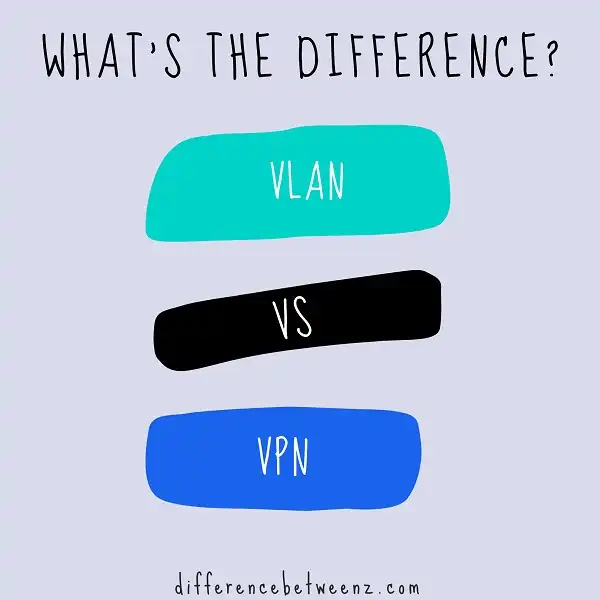There are many technologies used in networking, and two of the most common are VLANs and VPNs. While both have their purposes, they serve very different functions. In this post, we’ll take a look at the key differences between VLANs and VPNs. We’ll also explore when each technology is most appropriate. By the end of this post, you’ll be able to decide which technology is best for your needs.
What is VLAN?
VLAN stands for virtual LAN. A VLAN is a logical group of devices on a physical network that are not necessarily in the same location. VLANs are created to improve network efficiency and security. VLANs can be used to segment a network into different broadcast domains. This means that devices in one VLAN will not receive broadcasts from devices in another VLAN. VLANs can also be used to segment a network into different security zones. This means that devices in one VLAN will not be able to communicate with devices in another VLAN unless they have been specifically configured to do so. VLANs are typically created by switches, which can be hardware or software-based. Devices that are part of the same VLAN must be configured to use the same VLAN ID. When configuring VLANs, it is important to consider both the physical and logical layout of the network. VLANs can greatly improve both the efficiency and security of a network, but they must be properly planned and implemented in order to be effective.
Top reasons to use VLANs
VLANs, or virtual local area networks, are a key component of modern network design. VLANs offer several key benefits for businesses and organizations, including enhanced security, improved efficiency, and easier management.
- The first reason to use VLANs is that they offer enhanced security for network connections. VLANs allow you to segment your network so that different systems are kept separate. This means that if one part of your network is compromised by attack or virus, the rest of your systems will be protected from harm.
- Another reason to use VLANs is that they can help to improve overall efficiency within your organization’s networks. By segmenting different parts of the network, VLANs allow you to reduce congestion on certain lines and allocate more bandwidth to areas that need it most. Finally, VLANs make managing and monitoring your network much easier than ever before.
With many different VLAN configurations available, you can tailor the settings to meet your specific needs and business requirements. Whether you want greater control over who has access to certain systems or simply need ease of administration, there are plenty of good reasons to use VLANs in your organization’s networks.
What is VPN?
VPN, or virtual private network, is a specialized type of network that allows users to create secure, encrypted connections between remote devices. VPNs are often used by businesses to enable their employees to work remotely, and they can also be used by individuals for a variety of security-related purposes. VPNs typically use protocols like VPN-over-SSL or VPN-over-SSH to provide an extra layer of security and privacy for the data passing through them. Additionally, VPNs can allow users to bypass restrictions on certain content, such as websites that are blocked in certain regions or countries. Overall, VPNs are an extremely useful technology that can help to keep us safe and protect our data online.
Surf the web anonymously
Whether you are browsing the web at work or at home, it is important to protect your privacy and maintain anonymity online. One of the most effective ways to achieve this is by using a VPN, or virtual private network. VPNs allow you to mask your IP address and encrypt your traffic, making it much more difficult for anyone to track your online activity. Additionally, VPNs typically have high bandwidth and large server networks, allowing you to easily browse and download content without any lag or interruptions. Whether you want to safeguard sensitive data or simply keep your browsing habits hidden from prying eyes, a VPN can help you surf the web safely and securely.
Keep your data safe and secure
Online privacy is a major concern for many people these days, as the rise of digital technologies has made it easier than ever for our personal data to be collected, stored, and shared. One way to ensure that your online activities cannot be tracked and monitored is to use a VPN. VPNs help maintain anonymity by encrypting all data transmitted over the internet and masking users’ IP addresses. Beyond this, VPNs also allow individuals to create temporary alternate identities known as “virtual locations,” which can further safeguard privacy and enable safe web browsing. So if you want to surf the web safely and securely, consider using a VPN in order to stay anonymous. With its combination of encryption and virtual location features, a VPN will help keep your data safe while you browse the web.
Difference between VLAN and VPN
VLANs and VPNs are both networking technologies that can be used to separate traffic on a single network. VLANs use virtual LANs to segment traffic, while VPNs use encryption and other security measures to create a virtual private network. VLANs are typically used to segment traffic on a single network, such as a LAN or WAN. VPNs, on the other hand, are typically used to connect two or more networks, such as a LAN and the Internet. VLANs are typically cheaper and easier to configure than VPNs, but they offer less security. VPNs, on the other hand, can be more expensive and difficult to set up, but they offer better security and privacy.
Conclusion
Although both Virtual LANs and VPNs provide security for data transmissions, there are some key differences between the two technologies. We’ve outlined these differences for you here.


